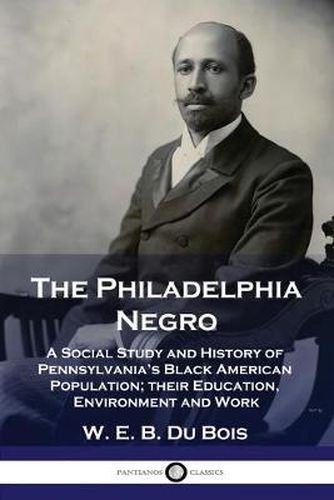Readings Newsletter
Become a Readings Member to make your shopping experience even easier.
Sign in or sign up for free!
You’re not far away from qualifying for FREE standard shipping within Australia
You’ve qualified for FREE standard shipping within Australia
The cart is loading…






This title is printed to order. This book may have been self-published. If so, we cannot guarantee the quality of the content. In the main most books will have gone through the editing process however some may not. We therefore suggest that you be aware of this before ordering this book. If in doubt check either the author or publisher’s details as we are unable to accept any returns unless they are faulty. Please contact us if you have any questions.
W. E. B. Du Bois’s groundbreaking social study of black Americans living in Philadelphia at the end of the 1800s remains an outstanding and thorough example of sociology.
Using knowledge gained from research of black neighborhoods during his time at the University of Pennsylvania, Du Bois was determined to create an all-embracing profile of urban black American society. Some three years of intensive research, interviews, and statistical gathering went into The Philadelphia Negro; it revealed endemic social prejudices and the abject poverty which many black Americans endured. The area studied was the Seventh Ward - a borough of Philadelphia which included the impoverished black ghetto, the striving middle-classes, and even affluent whites.
For Du Bois, the root causes of the social divide were ingrained negative perceptions towards black Americans, such as the notion that black workers are innately dishonest or indolent. Incidents of racial discrimination, whereby blacks in a line of business or seeking employ are turned aside on the basis of skin color, are numerous. More positively, the author unearthed multiple appraisals from those who had employed black workers - some only as a last resort - who became very impressed at their employee’s diligence, ability and passion.
Spanning the education, recreation, work, housing and environment conditions, and much more besides, The Philadelphia Negro remains a landmark text of sociology.
$9.00 standard shipping within Australia
FREE standard shipping within Australia for orders over $100.00
Express & International shipping calculated at checkout
This title is printed to order. This book may have been self-published. If so, we cannot guarantee the quality of the content. In the main most books will have gone through the editing process however some may not. We therefore suggest that you be aware of this before ordering this book. If in doubt check either the author or publisher’s details as we are unable to accept any returns unless they are faulty. Please contact us if you have any questions.
W. E. B. Du Bois’s groundbreaking social study of black Americans living in Philadelphia at the end of the 1800s remains an outstanding and thorough example of sociology.
Using knowledge gained from research of black neighborhoods during his time at the University of Pennsylvania, Du Bois was determined to create an all-embracing profile of urban black American society. Some three years of intensive research, interviews, and statistical gathering went into The Philadelphia Negro; it revealed endemic social prejudices and the abject poverty which many black Americans endured. The area studied was the Seventh Ward - a borough of Philadelphia which included the impoverished black ghetto, the striving middle-classes, and even affluent whites.
For Du Bois, the root causes of the social divide were ingrained negative perceptions towards black Americans, such as the notion that black workers are innately dishonest or indolent. Incidents of racial discrimination, whereby blacks in a line of business or seeking employ are turned aside on the basis of skin color, are numerous. More positively, the author unearthed multiple appraisals from those who had employed black workers - some only as a last resort - who became very impressed at their employee’s diligence, ability and passion.
Spanning the education, recreation, work, housing and environment conditions, and much more besides, The Philadelphia Negro remains a landmark text of sociology.